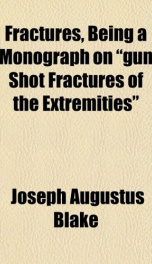fractures being a monograph on gun shot fractures of the extremities

Purchase of this book includes free trial access to www.million-books.com where you can read more than a million books for free. This is an OCR edition with typos. Excerpt from book: CHAPTER III TRANSPORT AND OPERATIVE TREATMENT OF FRACTURES IN GENERAL TRANSPORT The first treatment to be applied to a gun-shot fracture is the cutting away of the clothing, the painting of the wound and skin about it with iodine and the application of the first aid dressing. Then comes the most important (and often greatly mismanaged) part, namely, the transportation of the wounded man to the dressing station and thence on toward the rear. The question of transportation, so far as distance and stages are concerned, depends largely upon the exigencies of the military situation; but it has been amply proved during this war that the less the transportation the better for a fracture. In every case traction should be applied to the limbs in order to avoid laceration of muscles, vessels and nerves by the sharp fragments, and to prevent over-riding and stripping of the periosteum. If traction be efficiently applied harmful angulation at the site of fracture cannot occur. For the treatment of fractures during transport splints and apparatus must be light and non-cumbersome, for otherwise they cannot be taken to the advanced posts. Moreover, they should be of such a nature that they may be easily and quickly applied and not interfere with the dressing of wounds. They should be de- signed to produce reduction and maintain alignment of the bone fragments; treatment may then be continued with the same apparatus. It is difficult, however, to find an apparatus combining all these desiderata, and usually another is substituted at the hospital in which the treatment is carried out. The various splints will be described under the headings for each fracture. OPERATIVE TREATMENT Primary operations: No operation should be performed until the wounded reach a place where ...
Info about the book
Author:
Series:
Unknown
ASIN:
B00412GQR4
Rating:
3/5 (4)Your rating:
0/5
Languge:
English
Users who have this book
Users who want this book
What readers are saying
What do you think? Write your own comment on this book!
write a commentGenre
if you like fractures being a monograph on gun shot fractures of the extremities try:
Do you want to exchange books? It’s EASY!
Get registered and find other users who want to give their favourite books to good hands!


